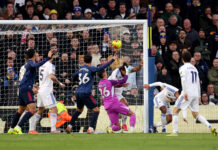The SPFL on Monday attempted to underline this entire sordid affair by awarding Celtic FC an un-won national title, and over the same stuttering Skype connection, consign Hearts FC to an unearned demotion to Scotland’s second tier.
If you can humour me for a few minutes, I’d like to consider – with the benefit of the hindsight we’re now afforded – how this situation should have developed under the stewardship of an impartial governing body overseeing events to the requisite professional standard (please, no laughing at the back).
As has been reiterated ad-nauseam, we find ourselves in times of unprecedented global crisis. The relative importance of football has been put sharply into perspective by a worldwide death toll now exceeding 320,000. That we’re even discussing football is, at the very least, distasteful – albeit we could perhaps be forgiven for viewing it as a welcome distraction to personal worries about health, employment and finances.
It’s against this backdrop that the potentially-still-ongoing saga of Scottish football’s season conclusion must be considered. The initial narrative which should undoubtedly have been set by those overseeing Scotland’s professional leagues must, therefore, have been:
1. We will attempt to play out all remaining league games, if at all possible, prior to the commencement of season 2020/2021.
2. If the league games cannot be completed, then the underlying principle which must be adhered to is that no single club should be in a better or worse sporting position than they would otherwise have been in without the emergence of Covid-19.
Whilst the vast majority of European leagues have afforded the virus an opportunity to play itself out, or at least to progress to a point whereby non-completion of the season is assured, the SPFL were unable to relax their trigger finger; proposing as early as 8th April to have a (now infamous) vote to change the league’s articles and thus facilitate the conclusion of the season. You can read the timeline of that day as everything that could have gone wrong did go wrong here.
The less said about the vote itself, the better. The myriad of shady dealings – and the subsequent learned opinions of no less than three separate QCs who suggest, for various reasons, that the vote would not be considered valid if legally challenged – has been adequately covered elsewhere and would only overshadow the main points of this piece.
So, at the point at which it was decided that the remainder of the season could not have been completed, we, therefore, return to the options which would have been examined by a sufficiently diligent SPFL board on behalf of its members.
The options, as suggested above, and in keeping with the underlying principles of sporting competition, should have revolved around the unerring logic that no single club should be in a better or worse sporting position than they would otherwise have been in without the impact of the virus.
We would then have faced two options, the first of which would have involved drawing a line under the entirety of the season. The only honours awarded would have been those which had already been secured. In this instance, that would be limited to Celtic FC’s capture of the Scottish League Cup in December of last year.

This option, despite maintaining the much-vaunted concept of sporting integrity, would have found significant resistance from those clubs who felt they were in a good position to secure success later in the season. While it’s difficult not to empathise with the predicament of such clubs when the implications of awarding un-won titles and unconfirmed relegations are contrasted against the integrity of the sport as a whole – the inherent magic of the unknown which allows football to write consistently stunning scripts – then the immediate pain to the few impacted clubs could be accepted as a necessary evil to guard the purity of competitive sport, where honours are won on the pitch, far away from boardroom discussions.
As an alternative to the first option, and to appease those clubs feeling aggrieved at an opportunity lost, member clubs would have weighed up the impact of the first option, then contrasted it against the relative merits of league reconstruction which had been developed in such a manner to ensure that no club was punished, or rewarded, as a consequence of the virus.
Such reconstruction may have extended to a 14-14-16 league setup, wherein the league numbers could have been increased to accommodate all promotions (including, importantly, both Kelty Hears and Brora Rangers), whilst sparing any unmerited relegations.
This approach would undoubtedly have ensured that only awards or punishments actually earned would have been bestowed, and in doing so would preserve the sporting integrity of the league. As we are now aware, through the documents contained with Rangers FC’s dossier, the SPFL are faced with a potential liability of up to £10m in any scenario where the league is ‘called’ early, be that with honours awarded or not. This issue – despite being used, rather deceitfully, by certain parties to argue against the cancellation of the league season – is, therefore, a red herring. It has no place in this discussion, and the SPFL should have made this abundantly clear at the very outset of this process.
It is clear that the above scenario was one which could have been fairly dealt with by strong leadership, who should have outlined the two options and made clear – from the outset – that no other solutions could deliver the fine balancing act of preserving sporting integrity – the ethos that no club should be in a better or worse position than they would otherwise have been in without the impact of the virus – while minimising the resentment from clubs who feel they have been hard done by in a global pandemic which is responsible for more than 320,000 deaths so far.
A little more perspective, some much-needed class, and a whole lot more authority from the so-called leaders of the Scottish game was the need of the hour. That’s all that was required to steer the game through these stormy waters.





Comments are closed.